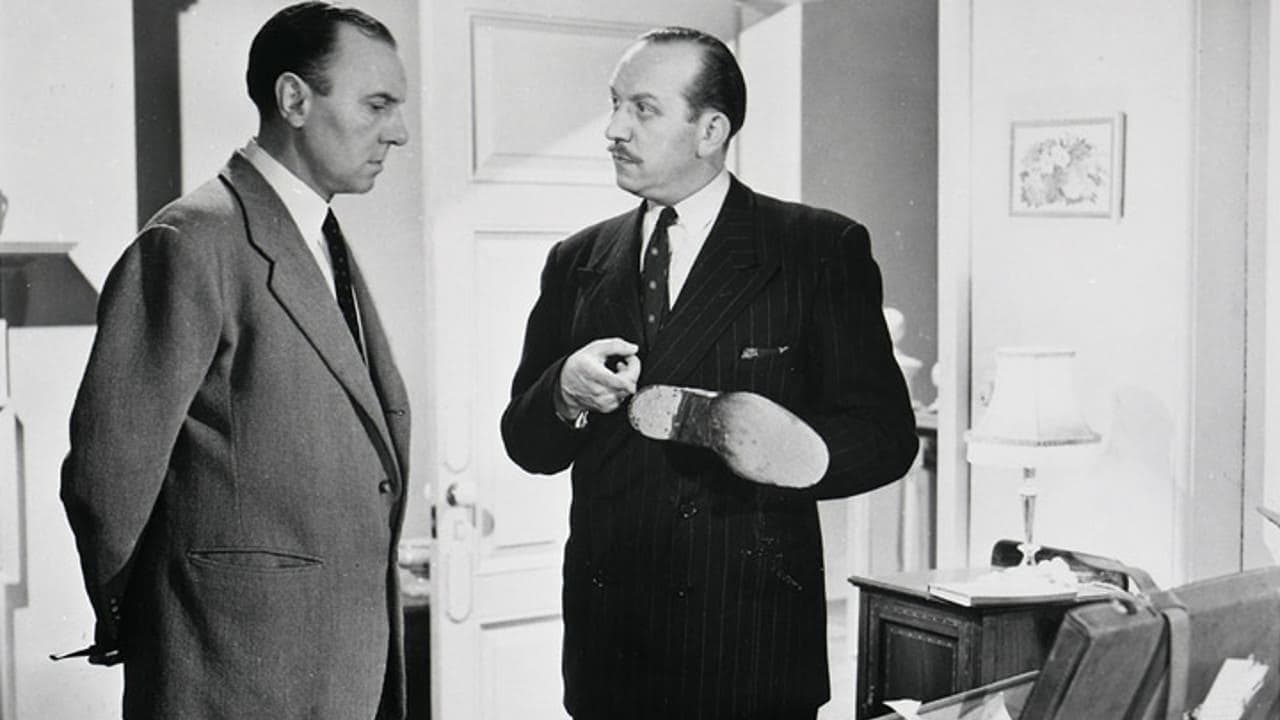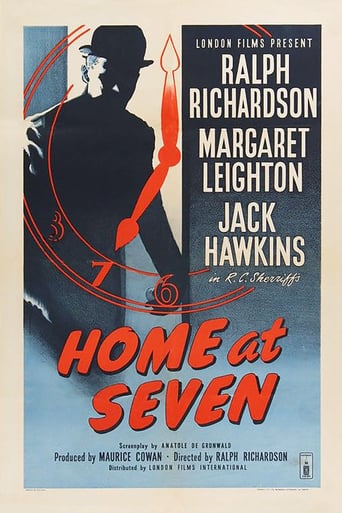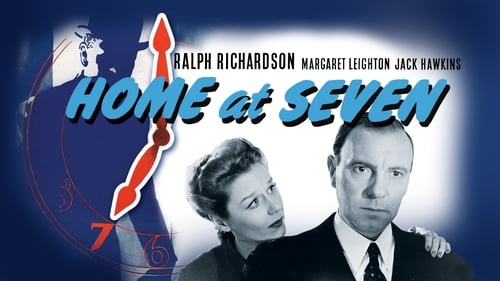writers_reign
Yet again Network do movie buffs a favour with the re release of what was, at the time, a main feature and the fact that it came and went without causing a stir says much about the early fifties and I think the farm is safe when I bet it that dozens of movies released around the same time to acres of newsprint are unwatchable today whilst Home At Seven proves very durable. It's a great pity that Ralph Richardson didn't direct himself more on film as he shows the vastly overrated Laurence Olivier how it should be done. With a sound basis in the theatre this engaging 'well-made play' by R.C. Sheriff is an excellent vehicle for Richardson who never puts a foot wrong as a victim of temporary amnesia who 'loses' a full twenty-four hours of his hum-drum life completely unaware - and very plausibly. In real life of course this would be distressing at worst but because this is real life heightened by a dramatist a certain spin is applied via the coincidental murder of a man openly despised by Richardson plus the theft of money for which Richardson, as Treasurer of a local club, has responsibility. Needless to say the matter is resolved happily but not before offering a time-capsule of a way of life now as remote as Atlantis.
XhcnoirX
Ralph Richardson arrives home from work at seven as he does every day, where he finds his wife Margaret Leighton sobbing. When she shows him the newspaper, it hits him: it's not Monday evening but Tuesday evening! He's been missing for an entire day, and he has no recollection of where he's been. While trying to figure out what happened with family doctor Jack Hawkins, they get news that the safe of Richardson's social club has been robbed, and a steward at the club murdered. Inspector Campbell Singer is investigating and all clues seem to lead to Richardson...Based on a play by R.C. Sheriff (and inspired by personal experiences) that also starred Richardson ('The Fallen Idol'), this is the sole movie that he directed. Which is quite a remarkable feat as he's in almost every scene. He does a very nice job tho, both in front of and behind the camera. He gives a great restrained performance and Leighton ('The Good Die Young') is perfectly cast as his wife. Together they make one of the sweetest couples I've seen lately, with some very touching scenes (esp the one where he tries to prepare her for life without him, while having tea and toast). The resolution of Richardson's predicament is quite satisfying and also adds depth to the movie and Richardson's psyche. It also shows how an innocent little white lie between husband and wife (and this one really is innocent), can have grave consequences... Richardson's directing and the camera work by Jack Hilyard ('The Bridge On The River Kwai') and Edward Scaife ('Night of The Demon') is straight-forward and devoid of flourishes but efficient and solid. It's not the most exciting movie ever made as it is primarily dialogue-driven, but it's a good uber-British stiff upper lip take on an amnesia noir thriller, with excellent and touching performances by Richardson and Leighton. Recommended. 7/10
robert-temple-1
This is certainly one of the most accurate portrayals on film of what psychologists call a 'fugue state', which is a dissociative disorder of human consciousness caused by a mental trauma. In this story, a perfectly ordinary bank executive played by Ralph Richardson experiences amnesia for a 24-hour period of his life, with disastrous consequences. Every evening, after leaving his job in the City of London, Richardson takes the train from Cannon Street Station and arrives home in the suburbs at seven. One Tuesday, he arrives home at seven to find his wife, played brilliantly by Margaret Leighton, in a terrible state of anxiety bordering on hysteria. She asks him where he has been, why he did not come home the night before, why was he not at work at the bank all day, and she informs him that she called the police and reported him missing. He is incredulous and says that she is talking nonsense, that here he is precisely at seven as always, and it is Monday, not Tuesday. But she shows him the newspaper and proves that it is really Tuesday. Thus the story begins, and everything becomes increasingly desperate and harrowing from there on. This is the first and only film directed by Ralph Richardson, and he has done a superb job of it. He received expert support from cameramen Jack Hildyard and Ted Scaife, with camera operator Denys Coop, and Assistant Director Guy Hamilton, all of whom later became famous. Although the film is not showy and does not have dramatic lighting and editing, the emphasis is on the story and the actors, which creates a considerable intensity, as the performances are all so good. The doctor who attempts to sort out Richardson's 'missing day' is expertly played by Jack Hawkins, who was always one of the most reliable as well as agreeable of British actors, whether as a lead or in a supporting role, as here. The reason why this film is so convincing and so accurate in its portrayal of this psychological condition is that it is based upon a play by R. C. Sheriff. Sheriff is chiefly famous for his play JOURNEY'S END, which was filmed in 1930 and subsequently three more times. It is a gripping film about the trenches of the First World War, based on Sheriff's own Army experiences prior to his being invalided out after the Battle of Ypres. (It is a superb film. I taped it off the air years ago but gave my tape to John Mills, who asked me for it because he wanted to see it again, as he had been touring in that play as a young man when he met his wife in Shanghai because she and her father Colonel Hayley Bell attended a performance, and it was love at first sight. He thus considered that in a way he owed his happy marriage to R. C. Sheriff.) Sheriff had a direct and personal experience of such matters as shell shock and the fugue states caused by battle trauma, which he put to good use in HOME AT SEVEN, since the explanation of Richardson's fugue state is eventually found to be because he heard a sound like a gunshot, which snapped him into a dissociative state where he imagined he was again under attack in the War. The story was filmed again for television by the BBC five years later, in 1957, with Peter Cushing in the lead. Sheriff's expertise at writing convincing stories about strange mental states was shown in the film THE NIGHT MY NUMBER CAME UP (1955). That is a film I know a great deal about indeed, as it is based upon a real paranormal experience of my close friend Air Marshal Sir Victor Goddard (who made a speech at my wedding), with whom I discussed both the experience and the film on many occasions. Sir Victor believed Sheriff had done a very good job of portraying his story in dramatic form, and that was Sheriff's great strength. He also wrote the famous ODD MAN OUT (1947) with James Mason, and he adapted the two excellent Somerset Maugham story compilation films, QUARTET (1948) and TRIO (1950). And of course he did the screenplays for the classics THE INVISIBLE MAN (1933), GOODBYE, MR. CHIPS (1939), and THE DAM BUSTERS (1955). He really was a giant of British stage and screen, and deserves to be better remembered. He died in 1975. This film does a first rate job of putting the story across, in a state of high anxiety and suspense. It turns out that for all the years of his marriage, Richardson had been telling a little white lie to his wife by saying he left work at 6, whereas he really left work at 5 and stopped off in the back room of a pub run by friends (as pubs only opened at 6) for a friendly and very tame sherry, and a game of darts. He didn't care to tell his wife lest he offend her, as she 'disapproved of alcoholic drinks'. This is Richardson's one guilty secret, surely the tamest one ever featuring as a major plot element in a suspense film! But because of it, no one can figure out where Richardson was for his 24 lost hours, and he is wrongly suspected of theft and murder. This film should be shown to psychology students at universities. I have made a considerable study of dissociative psychological states, and I can assure everyone that every detail of this film is accurate, clearly because it is based upon a real case or cases known to Sheriff, and possibly even others known to Richardson, thus perhaps explaining Richardson's strange enthusiasm for the story. It is always better when films about psychological cases such as amnesia and dissociation of personality are based upon facts, for then they are convincing and effective, as this is.
George Wright
Ralph Richardson, who both directs and acts in this film, has taken a simple story that depicts a short period in the life of a middle-class couple in post-war England whose routine is suddenly disrupted by the memory lapse of the husband. The story is brought to life by the acting of the three main actors - Richarson and Margaret Leighton as the couple and the medical doctor, Jack Hawkins.A veteran of World War II (1939-45), the dutiful husband is stricken with an anxiety attack that causes him to relive his days in battle. When this mental episode is over, he cannot remember what happened for a full 24-hour period. Husband and wife are perplexed and anxious by this sudden turn of events. They turn to their understanding family doctor for an explanation. The doctor, Jack Hawkins, is sympathetic and not overly worried but eager to find out the source of the problem.As it turns out, a theft and murder occurred that seem to implicate the husband or so the couple fears. Lies and cover-ups complicate the matter and the couple become so upset that they make things worse for themselves. The couple are so used to their routine that a sudden and unexplained twist becomes exaggerated. The story presents us with a puzzle and the reaction of two decent but somewhat docile human beings, who feel they will be unfairly targeted by the authorities. However, the police go about their work very calmly and before long everything is explained.The movie is a throwback to a time when ordinary people enjoyed simple pleasures like going to their club, or taking in the "pictures" and growing their chrysanthemums in the adjoining greenhouse garden...so very British. It is these very ordinary people that I have a great sympathy and admiration for in our often self-serving world. Nothing extraordinary about the movie or the couple but almost 60 years on, the acting still makes it a delight to watch.


